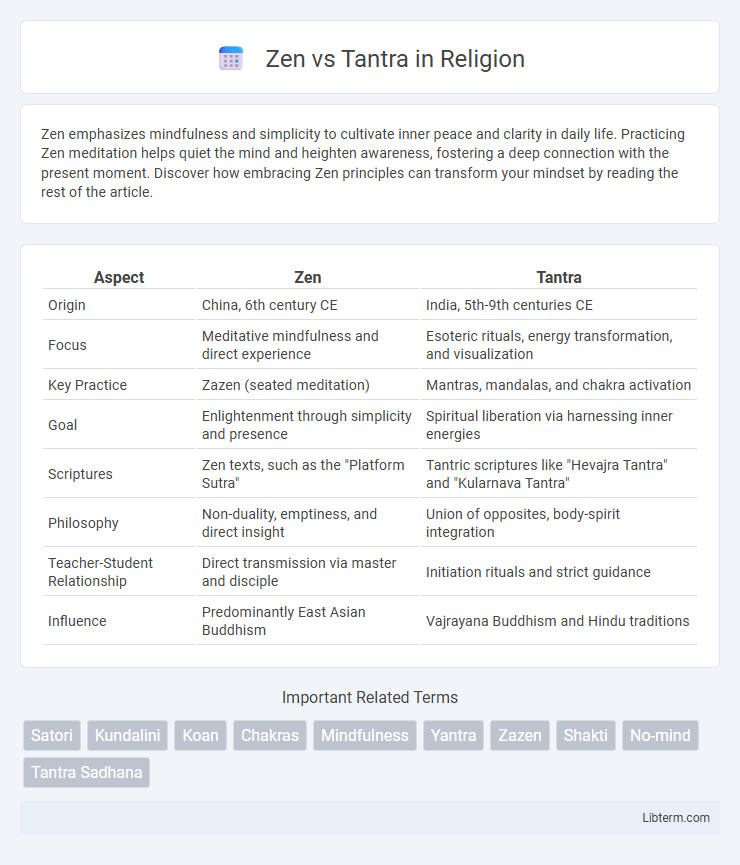Zen emphasizes mindfulness and simplicity to cultivate inner peace and clarity in daily life. Practicing Zen meditation helps quiet the mind and heighten awareness, fostering a deep connection with the present moment. Discover how embracing Zen principles can transform your mindset by reading the rest of the article.
Table of Comparison
| Aspect | Zen | Tantra |
|---|---|---|
| Origin | China, 6th century CE | India, 5th-9th centuries CE |
| Focus | Meditative mindfulness and direct experience | Esoteric rituals, energy transformation, and visualization |
| Key Practice | Zazen (seated meditation) | Mantras, mandalas, and chakra activation |
| Goal | Enlightenment through simplicity and presence | Spiritual liberation via harnessing inner energies |
| Scriptures | Zen texts, such as the "Platform Sutra" | Tantric scriptures like "Hevajra Tantra" and "Kularnava Tantra" |
| Philosophy | Non-duality, emptiness, and direct insight | Union of opposites, body-spirit integration |
| Teacher-Student Relationship | Direct transmission via master and disciple | Initiation rituals and strict guidance |
| Influence | Predominantly East Asian Buddhism | Vajrayana Buddhism and Hindu traditions |
Understanding Zen: Origins and Philosophy
Zen, originating from Mahayana Buddhism in China during the Tang dynasty, emphasizes direct experience and meditation (zazen) to achieve enlightenment. Rooted in the teachings of Bodhidharma, Zen rejects elaborate rituals and doctrinal study, highlighting mindfulness and simplicity as paths to self-realization. Its philosophy centers on awakening to one's true nature through disciplined practice and intuitive insight rather than intellectual analysis.
The Essence of Tantra: History and Core Principles
Tantra, originating in ancient India around 5th to 9th centuries CE, emphasizes the interconnection of body, mind, and spirit through ritual, meditation, and energy channels known as chakras. Central principles include the transformation of ordinary experiences into spiritual growth by harnessing kundalini energy and embracing both masculine and feminine aspects of consciousness. Unlike Zen's minimalist approach, Tantra incorporates elaborate symbols, mantras, and practices designed to achieve enlightenment by transcending dualities and integrating sensory experience.
Key Differences Between Zen and Tantra
Zen emphasizes direct meditation and mindfulness to achieve enlightenment through simplicity and disciplined practice. Tantra incorporates rituals, visualization, and the integration of physical and spiritual energies to transcend ordinary consciousness. While Zen focuses on emptiness and non-attachment, Tantra engages with symbolism and sacred energy pathways for spiritual transformation.
Meditation Practices: Zen vs Tantra
Zen meditation, or Zazen, emphasizes sitting meditation with focused breath awareness and observing thoughts without attachment to cultivate mindfulness. Tantra meditation incorporates breath control, visualization, mantra chanting, and subtle energy manipulation to awaken spiritual energy and achieve expanded consciousness. While Zen aims for direct insight into the nature of mind through simplicity and stillness, Tantra employs complex rituals and symbolic practices to transform and elevate energy.
Approaches to Mindfulness: Contrasts and Comparisons
Zen emphasizes mindfulness through seated meditation (zazen) focusing on breath and present-moment awareness, aiming for direct insight into the nature of mind. Tantra incorporates mindfulness within complex rituals, visualizations, and mantra recitations, blending sensory experience with meditative focus to transform ordinary perception. Both traditions cultivate heightened awareness but differ in method intensity and integration with spiritual symbolism.
Role of Rituals in Zen and Tantra
Zen emphasizes minimalistic rituals, focusing on simplicity and direct experience to cultivate mindfulness and enlightenment, often through seated meditation (zazen) and koan practice. In contrast, Tantra employs elaborate rituals involving mantras, mudras, visualizations, and ceremonies designed to transform energy and consciousness, integrating physical, mental, and spiritual dimensions. Rituals in Tantra serve as active tools for spiritual awakening, while Zen rituals aim to dissolve attachment to form and promote spontaneous insight.
The Path to Enlightenment: Zen vs Tantra Perspectives
Zen emphasizes direct experience and meditation (zazen) to attain sudden insight and enlightenment, focusing on simplicity and mindfulness in everyday activities. Tantra incorporates rituals, mantras, and visualization techniques, using the body and energy channels to transform desires into spiritual awakening through a gradual, disciplined path. Both paths aim for liberation but differ fundamentally in method: Zen pursues emptiness through silent awareness, while Tantra harnesses symbolic practices to unify opposites and reach transcendence.
Teacher-Student Dynamics in Zen and Tantric Traditions
Zen emphasizes direct transmission of insight from teacher to student through meditation practice and koan study, fostering a disciplined, experiential learning environment. In Tantric traditions, the teacher-student relationship is more intimate and ritualized, involving complex initiations and guided energy practices to facilitate spiritual transformation. Both traditions prioritize the teacher's role as a vital catalyst for awakening, but Tantra often entails a more secretive, personal mentorship compared to Zen's communal, meditative approach.
Influence on Modern Spirituality: Zen and Tantra Today
Zen and Tantra profoundly shape modern spirituality through their distinctive practices emphasizing mindfulness and energy transformation. Zen's minimalist meditation techniques promote present-moment awareness, influencing contemporary mindfulness and stress reduction. Tantra's integrative approach to sexuality and spiritual energy fosters holistic healing, blending ancient rituals with modern psychological exploration.
Choosing Your Path: Which Practice Resonates With You?
Choosing between Zen and Tantra depends on your spiritual goals and personal inclination; Zen emphasizes mindfulness, meditation, and simplicity to cultivate inner peace and clarity, while Tantra focuses on harnessing energy and embracing sensory experiences for spiritual growth and transformation. Zen practice involves disciplined meditation techniques and a minimalist lifestyle, making it suitable for those seeking mental stillness and insight. Tantra appeals to individuals drawn to dynamic rituals and the integration of body, mind, and spirit through esoteric practices.
Zen Infographic

 libterm.com
libterm.com